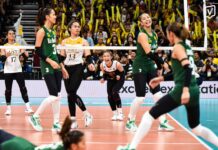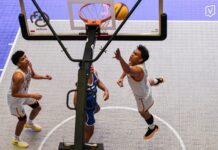 The Philippine Azkals, which made football history by shaming a regional powerhouse last year, included a Thomasian.
The Philippine Azkals, which made football history by shaming a regional powerhouse last year, included a Thomasian.
Though Golden Booter David Basa spent most his time warming the bench, he knows the experience was priceless especially that day the Azkals routed Vietnam before a capacity crowd of 40,000 at the My Dinh Stadium in Hanoi.
“I felt the pressure of the people as well as the weight of representing the country,” said the 21-year-old Basa, who is on his last playing year at the UAAP. “The intensity of the game was very different.”
Basa drew the interest of a member of the national team’s coaching staff who saw him play in UST’s tune-up games with the squad. He was formally recruited last August.
“Their coach saw me play and told me to go to their training. So I went there and they took me,” he recalled.
Filipino booters put the country back in the football map just before the year ended with the unexpected success of the underdogs in the ASEAN Football Federation Suzuki Cup 2010 last December.
The Azkals defeated no less than former champion and powerhouse Vietnam, 2-0, to barge into the semis. The feat was not unlike a UAAP basketball squad embarrassing the national team.
“The experience that I got there was something that I cannot experience here since this is not a football country,” Basa added.
Although he was not included in the first 11, he said far more important was the experience he gained in his journey with the pack.
“As a player, I’m still developing. The pace was really different and my teammates have a higher level of playing. When you get to play with players like James and Phil [Younghusband] every day, somehow your confidence really improves a lot,” Basa said.
“My knowledge of football widened because of them,” he added.
Although the Azkals fell short of making it to the championship after failing to score a goal against Indonesia, reaching the semi-finals in a tournament like the Suzuki Cup was already something to be proud of for the young booter.
“We were really considered underdogs there. The challenge for us was to show how the Filipinos played because almost everyone said that the Philippines was not (that) developed when it came to football,” he said, “But we reached the semi-finals and that’s it. Everyone came to know that there’s a football team here.”
The Azkals’ victory over Vietnam was arguably the biggest upset in the tournament’s history, according to English-based football journalist Georgina Turner, who gave the Philippines an honorable spot in her article in the Sports Illustrated magazine. Their success story was among the Top 10 football stories for 2010 despite the year being a FIFA year.
“Love affair” with football
Basa was supposed to get another stint in Mongolia this February with his fellow Azkals, but chose to play for UST because this was his last playing year in the UAAP. He is also one of the team captains of the UST football team.
Golden Booter coach Marjo Allado said his exposure with the national team would help the black-and-gold squad in its pursuit of the title.
“It is natural for a player who went to play with the national team in another country and come back with a higher level of confidence,” said Allado.
A student from the College of Tourism and Hospitality Management, Basa started playing the sport in high school at the Colegio de San Juan de Letran. He was also into swimming and track and field, but knew football was perfect for him.
For Basa, football is different from any other sport since it uses more of the mental skill than the physical.
“You need creativity and mind to be able to play the sport. But beyond that, it’s also really fun playing football,” he said.
Although the popularity of football is still no match to other sports like basketball despite its early fame in the 1970s and 80s, Basa makes his own little ways to be able to share the joy of the sport to other people—he coaches his college’s men’s and women’s football teams in the annual Thomasian Goodwill Games.
“Show them how fun it is to play the sport. Teach them how to play. Just give them an eye-opener and let them discover what football really is,” said Basa. Frauleine Michelle S. Villanueva


















